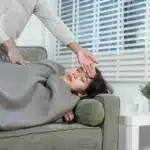Sussex Publishers. (n.d.-a). Free-floating anxiety: It’s not what you think. Psychology Today. https://www.psychologytoday.com/us/blog/the-three-minute-therapist/202402/free-floating-anxiety-its-not-what-you-think
Zaccaro A, Piarulli A, Laurino M, Garbella E, Menicucci D, Neri B, Gemignani A. How Breath-Control Can Change Your Life: A Systematic Review on Psycho-Physiological Correlates of Slow Breathing. Front Hum Neurosci. 2018 Sep 7;12:353. doi: 10.3389/fnhum.2018.00353. PMID: 30245619; PMCID: PMC6137615.
Smith, Sara. “BHP Blog – Behavioral Health Partners (BHP).” BHP Blog – Behavioral Health Partners (BHP) – University of Rochester Medical Center, 10 April 2018, https://www.urmc.rochester.edu/behavioral-health-partners/bhp-blog/april-2018/5-4-3-2-1-coping-technique-for-anxiety. Accessed 9 April 2025.
“Anxiety.” American Psychological Association, https://www.apa.org/topics/anxiety. Accessed 8 April 2025. https://www.apa.org/topics/anxiety#:~:text=Anxiety%20is%20an%20emotion%20characterized,the%20APA%20Dictionary%20of%20Psychology
“Any Anxiety Disorder – National Institute of Mental Health (NIMH).” National Institute of Mental Health, https://www.nimh.nih.gov/health/statistics/any-anxiety-disorder. Accessed 8 April 2025.https://www.nimh.nih.gov/health/statistics/any-anxiety-disorder
“Psychotherapy: Understanding group therapy.” American Psychological Association, 31 October 2019, https://www.apa.org/topics/psychotherapy/group-therapy. Accessed 20 February 2025.
“APA Dictionary of Psychology.” APA Dictionary of Psychology, https://dictionary.apa.org/cognitive-behavior-therapy. Accessed 20 February 2025.
“What is EMDR?” EMDR Institute, https://www.emdr.com/what-is-emdr/. Accessed 20 February 2025.














